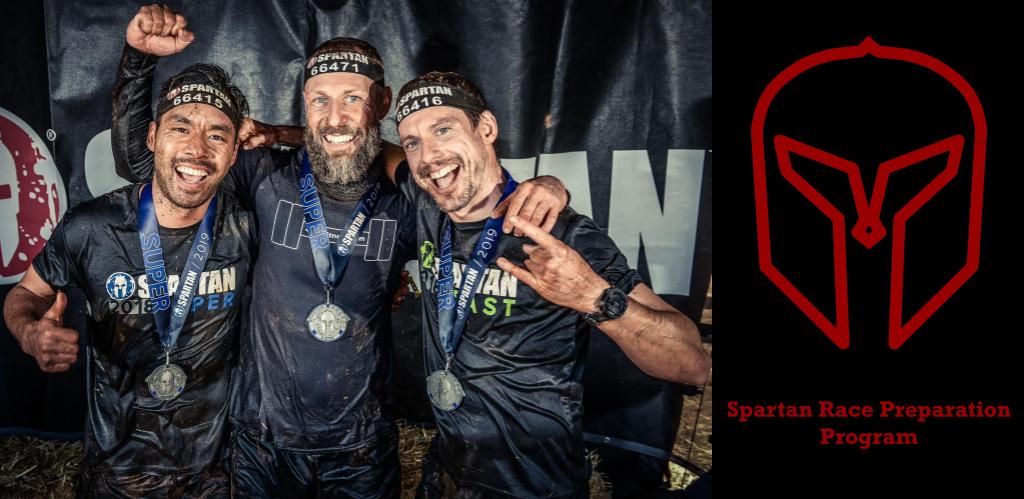How to Develop Mental Toughness

Thank you for subscribing!
Have a great day!
What gets you going when the going gets tough?
What makes you truly stand out?
Part of it surely are your talents, abilities and condition. But when you are really, really challenged, what keeps you going is your attitude and drive that makes you continue. This is summarised as mental toughness.
In this article, I will discuss how to develop mental toughness. I will describe exactly what mental toughness is and why it is important. I will present to you a bit of theory in the form of the 4C model which is the most useful model for understanding and improving mental toughness. I will summarise the key components that you’ll need as a basis and then go into a practical six-step guide to develop mental toughness.
Ready?
What Is Mental Toughness?
Simply put, mental toughness helps us cope better when life gets hard.
Mental toughness refers to how effectively you can deal with challenges, pressure, and stressful situations in life. These situations include abrupt events that require you to react quickly in a certain way so that you and others stay safe. An example of this could be an unexpected event while you are climbing like a sudden weather change or your partner getting injured. In a work situation, it could mean that a client calls you late in the evening with a serious problem that you are not prepared for.
Other situations may be longer term, like sticking to a tough workout and nutrition plan for several months in order to achieve a goal like preparing for a competition. All these require mental toughness.
Being mentally strong is about your coping skills in difficult and maybe unexpected situations. Key components include self-awareness, positive thinking, emotional resilience, adaptability, and discipline.
Mental toughness is not just about enduring hardships. It also involves the capacity to bounce back from setbacks, learn from failures, and maintain a positive attitude in the face of obstacles.
Why Is Mental Toughness Important?
Mental toughness is important because it empowers us to overcome limits, achieve goals, perform under pressure, cope with stress, adapt to change, lead effectively, and maintain emotional well-being.
Solid physical health and strength will get you far. But you make a difference in sports and life in general if you also develop your mental toughness. By cultivating it, we can navigate life's challenges with greater resilience, confidence, and success.
Here are some examples from my own experience.
I have participated in numerous challenging sports projects, like Spartan obstacle course races, ice climbing, or climbing the Matterhorn -- one of the deadliest mountains in the world. This summer, I will be off-road motorcycle riding in the harsh environment of Namibia. In all these projects I am facing unpredictability and discomfort. To push through requires mental toughness.
To progress towards my goal of financial freedom, I am involved in various investment activities like art, organic almond farming or tiny houses and entrepreneurial projects like the 4 Legs of Fitness, PortCamper Germany, or Live better, not perfect. I put most of my time, energy, and money into these activities. They all carry huge risk and most of them don’t work out. I need mental toughness to still carry on and not lose the will to live.

Before we get into a useful mental toughness model, I’d like to introduce a challenge that is particularly hard to complete: 75 Hard, which is a “transformative mental toughness program.” The rules are:
Follow a nutrition plan of your choice (no alcohol or cheat meals)
Two 45-minute workouts (one of those must be outside)
Drink 1 gallon of water
Read 10 pages of a nonfiction, personal development-focused book
Take a progress picture
Do this every day for 75 days. If you fail one, you have to start all over again. Some of the rules don’t necessarily make sense but it is extremely tough to complete this for 75 days next to your normal work and family life. That is why it is a pretty good test for mental toughness.
The 4Cs of Mental Toughness
The probably most wide-spread and most useful model for understanding and improving mental toughness was developed by psychologists Peter Clough and Doug Strycharczyk. It is composed of four components: control, commitment, confidence, and challenge. Hence, it’s called the 4C model and described in their book about Developing Mental Toughness.
The diagram below illustrates the model. The 4Cs can further be classified related to inner strength, outer orientation, resilience and positivity. Each C has two further sub-components. Let’s take a closer look.
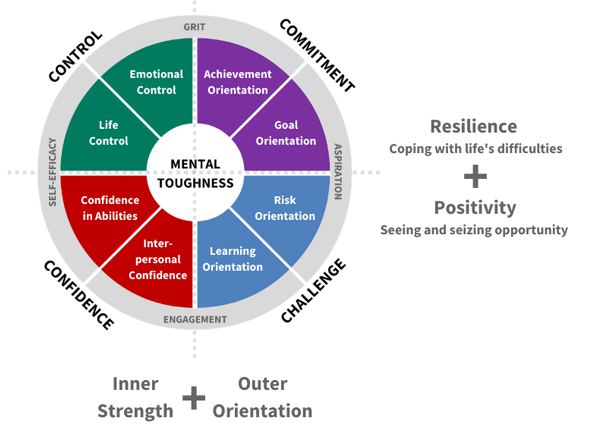
Image credit: www.getmentallyfit.com.au
Control
Mental toughness involves having a sense of control over your life and emotions. This control is related to inner strength. We cannot control much outside of us (more about the circle of control later). Inner control is about one's emotions, thoughts, and actions, especially in high-pressure situations. Your life’s purpose is something that you control.
Cultivate self-regulation skills to manage stress, anxiety, and distractions effectively. Focus on what you can control and let go of what you cannot influence.
Commitment
Mental toughness requires commitment to your goals and values, even in the face of adversity. Mentally tough people are committed to goals as well as achievements. They are able to understand what they want, set strong goals accordingly, go ahead and achieve them, and grow from their achievements. Stay dedicated to your pursuits, persevere through challenges, and maintain a strong work ethic.
The control and commitment components of the 4C model together represent the resilience part.
Challenge
Challenges are not to be feared or shied away from. You should embrace challenges as opportunities for growth and self-improvement. Mental toughness involves seeking out and confronting challenges rather than avoiding them. Approaching difficult tasks always requires a certain appetite for risk. You may fail. However, with a positive attitude there is no failure: You either succeed or you learn.
Confidence
Confidence completes the picture. It describes your self-belief in your own abilities and the interpersonal confidence to influence others to deal with conflict and challenge. Mentally tough people have the confidence to approach challenges head on because they have a strong self-believe (i.e., they know) that they succeed.
Developing belief in your abilities and trust in your capacity is essential to overcome obstacles and achieve your goals. The best way to achieve that is to cultivate a strong sense of self-efficacy, building on past successes and focusing on your strengths.
The 4C model is a good theory to break down and understand mental toughness better. In the next section, I’ll make it more concrete and highlight some of the underlying traits necessary for mental toughness.

Key Components Of Mental Toughness
Mental toughness requires some traits. The good news is that they can all be learned and improved.
Profound Self-awareness
Understanding yourself is the first step to developing more mental toughness. If you want to hop on that journey you need to know where you start and where you want to end up. This includes awareness of your strengths, weaknesses, values and purpose. What do you want to achieve? Do you have what it takes to do that?
Based on that you can set your goals and create an execution plan. Improve your self-awareness by introspection and asking others for feedback about yourself.
Positive Thinking
People who are mentally tough usually also are able to think positively most of the time. Thinking positively is a constructive approach to overcoming challenges. It can be practiced. Almost always there is some sort of positive angle to everything. We “simply” need to train ourselves to see it.
One idea that I find extremely helpful for this is Stephen Covey’s Circle of Concern, which he described in his book The 7 Habits of Highly Effective People. The power of this model is to focus your energy on the inner circle -- i.e. the things that you can control.
For example, you planned to go hiking on the weekend but the weather is shit. You could be upset and miserable because of this. Or you apply some positive thinking, focus on what you can control, which is your attitude, and change your plans, like cooking a nice meal, meet a friend or read a good book.
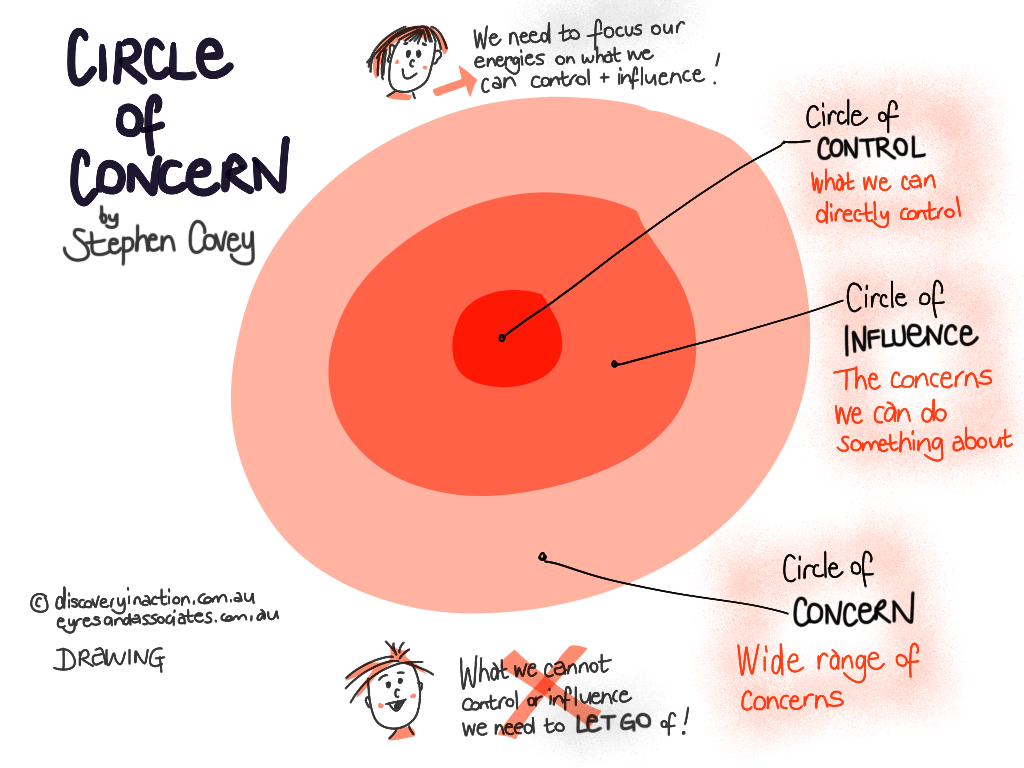
Willingness To Tackle Challenges
Jocko Willink once said: "To be tougher, just be tougher!"
We will not become tougher mentally or else if we always simply stay in our comfort zone. Improvement and growth happens outside of our comfort zone. Hence, the willingness to deliberately put ourselves into uncomfortable situations is an important ingredient to practice mental toughness.
There are many ways to do that. Literally everything that you are scared of or that you don’t want to do. Public speaking is one example. Having that tough conversation with a co-worker or family member, climbing when you are scared of heights, continue exercising even when it burns or completing a fast are other examples. One I particularly like is regular cold exposure like cold showers or jumping in a lake or river.

Discipline
To continue doing stuff that’s tough requires discipline. Motivation is great to get you started but it fades. You need to develop discipline to keep going consistently and create that change that you want to see in yourself -- be it physically or mentally.
A very practical method to improve your discipline is to create systems and form habits. In the next section, I will go into more details regarding both.
General Health
Having good general health is the basis for everything -- and one of the two components of my happiness formula. You need a healthy basis to build your mental toughness on top. Hence, practice self-care. Take care of your physical, emotional, and mental well-being. This actually goes both ways: mental toughness will in turn help you recovering from health challenges.
Prioritize self-care activities such as exercise, healthy eating, adequate sleep, relaxation techniques like meditation (which can have many forms including deep breathing), stress reduction, spending time outside, and surrounding yourself with good people. Nourish your mind, body, and soul to fuel your energy reserves and it will enhance your resilience in the face of adversity.
In the next section, I provide a practical guide about how you can implement the theory and develop mental toughness.
A Practical Guide To Develop Mental Toughness
Below are you six steps to develop mental toughness. Motivation is a great staring point but it will fade. In order to stay on track, habit forming is an incredibly effective method. Below is how.
Define Your New Identity and Set Clear Goals
This is an idea from James Clear’s book Atomic Habits. In order to form lasting habits you need to reinvent your identity first. Your current behavior is a reflection of your current identity. Only if you change your identity -- the way you want to see yourself -- you will create the inner strength to stick to habits long-term.
Decide who you wish to become (your new identity). Start believing new things about yourself in line with that identity. This is the basis for setting your goals and deriving your habits. If you define your new identity as a mentally tougher person, then build daily habits that allow you to stick to a plan and overcome challenges over and over and over again.
Focus on Small Improvements Consistently
When we start something new, we often tend to set our planned achievements too high. At the beginning we may succeed but it won’t be sustainable and we most likely fail. A good example is weight loss. You can do a hardcore fast and you will reduce weight fast but you won’t be able to stick to it. As soon as you stop, you regain your weight or even more.
The better albeit less sexy approach is to focus on tiny gains but consistently. Tiny, daily gains are easy to do but not so attractive as we don’t see progress that easily. However, according to James Clear, if we improve only 1% each day, at the end of the year we’ll end up thirty-seven times better due to the compounding effect.
Tracking is a great way to visualize your progress over time and to make tiny gains more attractive. I’ll cover this next.
Build Support Systems
The next step in your habit forming process is to build support systems. In order to keep momentum after when motivation is long gone, we need an environment and automation that help us stay on track. A good system does include supportive people like family and friends or dedicated groups that share your goal or path.
Tools and software can be incredible effective too. I highly recommend to find a way to track your habit compliance. This is very easy and can be done with paper and pen or a calendar. I use the Loop Habit Tracker, which is a free and open source app. I love it because it is super simple, no fuzz, no ads, no one million features that nobody needs. Just straight to the point habit definition and tracking.

Test Your Progress
Earlier in this article I wrote about the willingness to tackle challenges. This is a key step also in successfully forming your habits. From time to time you should challenge yourself and test your progress related to your habit. It may be tough but you can only win. You will get feedback in any case. If you pass your challenge positively it will further boost your confidence.
A useful concept for choosing the challenges is Goldilocks Rule. This rule states that humans experience peak motivation when working on tasks that are right on the edge of their current abilities. So, choose your challenges not too hard but also not too easy.
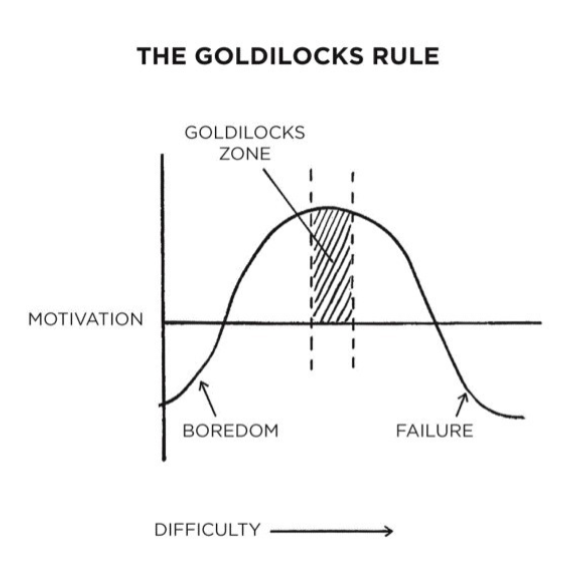
Image credit: “Atomic Habits” book by James Clear
Fail But Bounce Back Quickly
If you do fail in your challenge, which is part of the process and totally fine, then make sure you analyse and understand why. Draw your conclusions from it, derive what you wanna change and continue on your journey to the next challenge. This is very strongly related to positive thinking, which I discussed earlier in this article.
Better fail fast, learn and bounce back than not trying, not failing, not learning, not improving but just standing still.
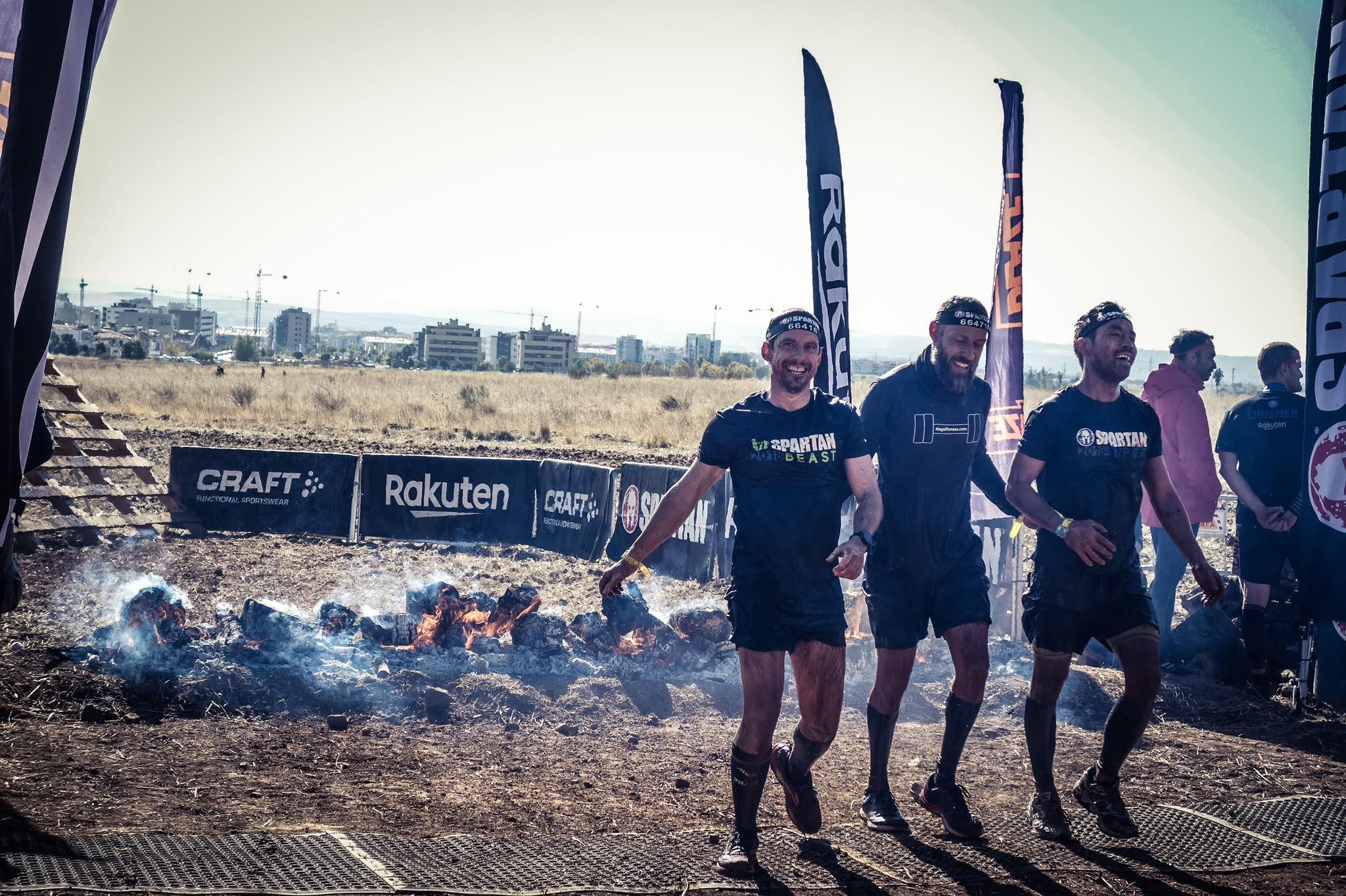
Be Proud and Celebrate
Self-care is a very important component of in the process of developing mental toughness. Part of this is also your feel-good factor. So, whenever you achieve another milestone, acknowledge this achievement, be proud of it and celebrate it. This will influence the progress of the rest of your journey positively.
The Key To Developing Mental Toughness
If you don’t wanna be a couch potato but get on well in life and work towards your purpose, I highly recommend to actively develop your mental toughness.
In this article I covered several angles including the clear benefits of being mentally tough, helpful theory (the 4C model), building the basis with the key components of mental toughness, and the six-step guide.
Throughout this article, I was referring to challenges such as competitions to sharpen your mental toughness. Why don’t you consider participating in a grueling obstacle course race (OCR) or a Spartan race? I developed the Spartan Race Preparation program, which is a training plan to get you physically and mentally ready.
For more info, click the banner below or contact me.
Full Disclosure and Disclaimer:
I am affiliated with Amazon, Teachable, and Blinkist. If you use my affiliate links, I may get a commission. You help me a lot producing more content like this. For details, contact me.
I am not a financial advisor. I present my view on things that work well for me. I am not taking any responsibility for your decisions. Always do your own due diligence before you invest.
